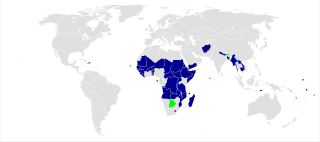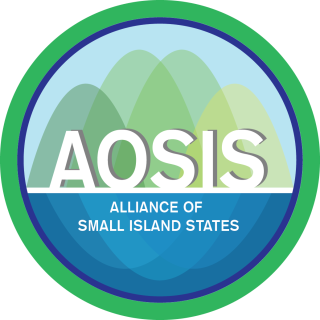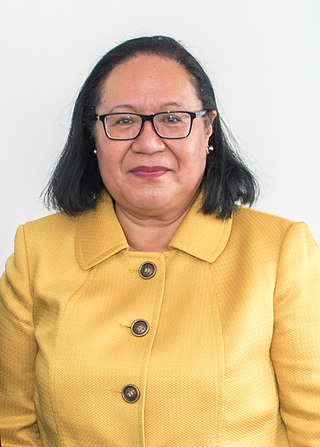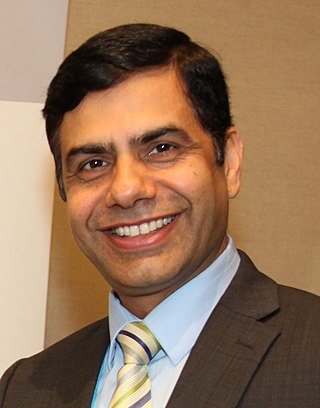Related Research Articles

The United Nations Secretariat is one of the six principal organs of the United Nations (UN), The secretariat is the UN's executive arm. The secretariat has an important role in setting the agenda for the deliberative and decision-making bodies of the UN, and the implementation of the decision of these bodies. The secretary-general, who is appointed by the General Assembly, is the head of the secretariat.

The least developed countries (LDCs) are developing countries listed by the United Nations that exhibit the lowest indicators of socioeconomic development. The concept of LDCs originated in the late 1960s and the first group of LDCs was listed by the UN in its resolution 2768 (XXVI) on 18 November 1971.

The United Nations Institute for Training and Research (UNITAR) is a dedicated training arm of the United Nations system. UNITAR provides training and capacity development activities to assist mainly developing countries with special attention to Least Developed Countries (LDCs), Small Island Developing States (SIDS) and other groups and communities who are most vulnerable, including those in conflict situations.
Anwarul Karim Chowdhury is a Bangladeshi diplomat most noted for his work on development in the poorest nations, global peace and championing the rights of women and children. In a speech he gave in 2005, Chowdhury stated: "We should not forget that when women are marginalized, there is little chance for an open and participatory society." In his role as the leading United Nations Culture of Peace emissary, he said in May 2010 that peace efforts would continually fail until people embraced humanity's oneness.

Alliance of Small Island States (AOSIS) is an intergovernmental organization of low-lying coastal and small island countries. AOSIS was established in 1990, ahead of the Second World Climate Conference. The main purpose of the alliance is to consolidate the voices of Small Island Developing States (SIDS) to address global warming.
The landlocked developing countries (LLDC) are developing countries that are landlocked. The economic and other disadvantages experienced by such countries makes the majority of landlocked countries the least developed countries (LDCs), with inhabitants of these countries occupying the bottom billion tier of the world's population in terms of poverty. Outside of Europe, there is not a single highly developed landlocked country as measured by the Human Development Index (HDI), and nine of the twelve countries with the lowest HDI scores are landlocked. Landlocked European countries are exceptions in terms of development outcomes due to their close integration with the regional European market. Landlocked countries that rely on transoceanic trade usually suffer a cost of trade that is double that of their maritime neighbours. Landlocked countries experience economic growth 6% less than non-landlocked countries, holding other variables constant.

Small Island Developing States (SIDS) are a group of developing countries that are small island countries and tend to share similar sustainable development challenges. These include small but growing populations, limited resources, remoteness, susceptibility to natural disasters, vulnerability to external shocks, excessive dependence on international trade, and fragile environments. Their growth and development are also held back by high communication, energy and transportation costs, irregular international transport volumes, disproportionately expensive public administration and infrastructure due to their small size, and little to no opportunity to create economies of scale. They consist of some of the most vulnerable countries to climate change.
In several French-speaking countries and international organisations, a chef de cabinet is a senior civil servant or official who acts as an aide or private secretary to a high-ranking government figure, typically a minister. They typically work in the ministerial office.

The United Nations Department of Economic and Social Affairs is part of the United Nations Secretariat and is responsible for the follow-up to major United Nations Summits and Conferences, as well as services to the United Nations Economic and Social Council and the Second and Third Committees of the United Nations General Assembly. UN DESA assists countries around the world in agenda-setting and decision-making with the goal of meeting their economic, social and environmental challenges. It supports international cooperation to promote sustainable development for all, having as a foundation the 2030 Agenda for Sustainable Development and the 17 Sustainable Development Goals (SDGs) as adopted by the UN General Assembly on 25 September 2015. In providing a broad range of analytical products, policy advice, and technical assistance, UN DESA effectively translates global commitments in the economic, social and environmental spheres into national policies and actions and continues to play a key role in monitoring progress towards internationally agreed-upon development goals. It is also a member of the United Nations Development Group.

Fekitamoeloa Katoa ‘Utoikamanu is a Tongan civil servant, diplomat and Cabinet Minister currently serving as Tonga's Minister of Foreign Affairs. From 2005 to 2009 she was Tonga's permanent ambassador to the United Nations, and from 2017 to 2021 she was United Nations High Representative for the Least Developed Countries, Landlocked Developing Countries and Small Island Developing States.

Cheick Sidi Diarra is a Malian diplomat.
Tuvalu became the 189th member of the United Nations in September 2000. Tuvalu is one of 14 states not recognising the People's Republic of China. The country has played a role in advocating for more ambitious international cooperation on mitigating climate change, given the country's vulnerability to its impacts.
LDC Watch is an alliance of organizations based in Least Developed Countries and other related organizations. Based in Belgium, it coordinates activities in the fields of trade, debt, foreign investment, human rights, governance and conflict resolution. LDC Watch undertakes lobbying, networking and advocacy with LDC governments and development agencies. Its aim is to implement a programme of action formulated at a UN Conference in Brussels in 2001, with the participation of civil society.
Alounkeo Kittikhoun is a Laotian diplomat and statesman. He served as Minister to the Prime Minister's Office from 2016-2020 and Vice Minister for Foreign Affairs of Laos, and was the country's ASEAN Senior Officials Meetings (SOM) Leader. Prior to his Vice Ministerial role, Kittikhoun was Assistant Minister for Foreign Affairs (2007-2011). This position was preceded by his service as the Lao Ambassador and Permanent Representative to the United Nations in New York (1993-2007). Kittikhoun is noted for maintaining the longest length of service as a Lao diplomat, and is one of the longest-serving Ambassadors at the United Nations.

Lakshmi Murdeshwar Puri is a former assistant secretary-general at the United Nations and the former deputy executive director of UN Women. Prior to her 15-year stint at the United Nations, she served as an Indian diplomat for 28 years. From 1999 until 2002, she was India's Ambassador to Hungary, while also concurrently accredited to Bosnia and Herzegovina.

Gyan Chandra Acharya is the Nepali ambassador to the United Kingdom since January 2021, and the former United Nations Under-Secretary-General and High Representative for the Least Developed Countries, Landlocked Developing Countries and Small Island Developing States. He was appointed to this position by the UN Secretary-General Ban Ki-moon on 14 August 2012.

Django Sissoko was a Malian civil servant who was Prime Minister of Mali from December 2012 to September 2013. He was Minister of Justice from 1984 to 1988 and subsequently served twice as Secretary-General of the Presidency, from 1988 to 1991 and from 2008 to 2011. He also served as Ombudsman from 2011 to 2012.
The Sopoaga Ministry was the 14th ministry of the Government of Tuvalu, led by Prime Minister Enele Sopoaga. It succeeds the Telavi Ministry upon its swearing in by Governor-General Sir Iakoba Italeli on 5 August 2013.

Earle Courtenay Rattray is a Jamaican diplomat who has been serving as the United Nations High Representative for the Least Developed Countries, Landlocked Developing Countries and Small Island Developing States since 2021.
Thoriq Ibrahim is the current Minister of Environment and Energy for the Maldives. Ibrahim acquired a bachelor's degree in Engineering from Loughborough University of Technology in 1995, a master's degree in science from the National University of Singapore in 2002, and an MBA from Preston University in 2004. After finishing schooling, he took on a variety of engineering and project management work, most notably being the Project Director for the rebuilding nine houses that were damaged in the 2004 tsunami. He is also the chairman of the Alliance of Small Island States. Ibrahim has been outwardly critical of US President Donald Trump's 2017 decision to withdraw America from the Paris agreement to combat climate change.
References
- ↑ "Office of the High Representative for the Least Developed Countries, Landlocked Developing Countries and Small Island Developing States |". www.un.org. Retrieved 2022-07-10.
- 1 2 "About UN-OHRLLS". UN-OHRLLS. United Nations. Retrieved 11 May 2013.
- ↑ "SECRETARY-GENERAL NAMES ANWARUL CHOWDHURY HIGH REPRESENTATIVE FOR LEAST DEVELOPED COUNTRIES, LANDLOCKED DEVELOPING COUNTRIES, SMALL ISLAND DEVELOPING STATES | Meetings Coverage and Press Releases". www.un.org. Retrieved 2022-04-14.
- ↑ "Secretary-General Appoints Cheick Sidi Diarra of Mali as the Special Adviser on Africa and High Representative for the Least Developed Countries, Landlocked Developing Countries and Small Island Developing States (OSAA/OHRLLS)". Department of Public Information, News and Media Division. United Nations. Retrieved 22 January 2008.
- ↑ "Secretary-General Appoints Gyan Chandra Acharya of Nepal High Representative for Least Developed, Landlocked Developing, Small Island States". Department of Public Information, News and Media Division. United Nations. Retrieved 8 February 2013.
- ↑ "Biography". UN-OHRLLS. Retrieved 2019-04-04.
- ↑ Secretary-General Appoints Courtenay Rattray of Jamaica High Representative for Least Developed, Landlocked Countries, Small Island Developing States United Nations, press release of April 26, 2021.
